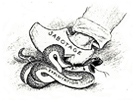PEPO SALAZAR LACRUZ
Reinforcement of Good Responses
September 29, 2023 - November 20, 2023
Opening: Friday, September 29, 7pm
exhibition views
Pepo Salazar Lacruz is a Basque artist living and working in Paris, where he also
teaches at the PCA Paris College of Art. Throughout his artistic career, he has
developed a multidisciplinary practice encompassing sculpture and installation,
but extending to other media such as music and sound, writing, collage,
performance, editions and the moving image, among others. Often working with
everyday objects, ranging from the banal to the absurd, from the over-
conceptualized to the ideologically charged, Pepo Salazar Lacruz arranges them
in new constellations while seeking to subvert the objects' symbolic values to bring
out a new meaning, a critical abstraction of reality. Thus, his works contain an
inherent critique of, for example, capitalism, its institutions, consumer culture and
the influence of mass media, but strongly avoid asserting a single perception and
interpretation. Instead, the artist's rhizomatic, fluid approach sees objects as their
own agents, actively producing inconsistencies and autonomous performativity.
In 2015, Salazar Lacruz represented Spain at the 56th Venice Biennale.
___ (extract from a conference)
The truth is that, in general and with the exception of a few cases like this, where
it's myself talking about my work, I'm not in favor of press release sheets or other
additions that surround, or are imposed on works of art. I don't really agree with
the idea of hyper-mediation that characterizes our age. This is because I believe
that works of art must enjoy maximum autonomy if they are not to be reduced to
mere metaphors, archives or illustrations of the given. Works of art must free
themselves from the authoritarianism of the concept and the super-signifying
(capitalist) apparatus because, if we look closely, the latter strives, often
ideologically, to transform the subject into a consumer; it transforms works of art
into closed products, dependent on something external (which we call a system),
in order to add a meaning to them which then becomes a function. Like yet
another commodity governed by instrumental functioning. And this contradicts the
fundamental idea that works of art should move away from our most stable
foundations by dissolving or questioning existing frameworks.
Aesthetic operations are worthwhile when they don't translate, when they don't
transfer, because it's by opening themselves up to powerlessness that they can
provoke a space of freedom in which thought is not a prisoner of its automatisms
or of dominant semiologies and conventions; by suspending the normal
coordinates of sensory experience, the subject can arrive at formulations of
himself and of the world that are not mere expressive gestures or simple
documentations.
Works of art do not signify, rather, they "sensitize", they generate meaning and
thought, but thought without knowledge, non-instrumental thought; they are
impressions that live on in impressions.
We never talk about what we see, or, as Deleuze puts it, "what we see never
resides in what we say.... Inexact expressions are needed to designate something
exactly". In everyday language, we talk about things, but they don't care what
we're talking about. If art produces thought, it does so only by recreating in the
viewer the process that made it present. What the work "signifies" is
fundamentally a presence arising from the human being, and as such, artworks
are presentations; if nothing signifies much (what does the world signify?), why
should artworks signify anything other than their own presence / transparency and
activation of the thought process that has not yet been instrumentalized?
Some works of art (the most autonomous) present, others represent, but both lay
bare their process, making it visible so that the viewer can recreate them and
participate in the speculative and performative processes that generated them; it
is performance. On the other hand, metaphor alone is insufficient. Works must be
excessive, infinite equivalences performed in a rhizomatic device.
LOVE AFFAIR CAPITALISM WITH IMAGE
Perhaps because I believe that hyper-subjectification has become one of the most
powerful signs of unscrupulous capitalism, I want to escape my own singularity
and avoid all my work having a brand, a style (which is why I change every time).
Today, I want to de-identify, de-subjectivize even more, I want my pieces to be just
as disaffected (the affects?) while protecting themselves from clarification,
function, convention and the semiological limit. Guattari said that power can only
be maintained insofar as it relies on the dominant semiologies of signification.
For all these reasons, I don't want to make simple tropes or have my pieces
belong to a specific medium. Nor do I want to participate in a system (rather, an
amorphous device), to be a craftsman or a producer, or to work with gestures and
materials that are not only banal, but increasingly disaffected and insignificant. I
avoid persuading or giving moral lessons. I don't sell anything. And I protect
myself from explanation because I'm changing.
___________________________________________Pepo Salazar Lacruz
